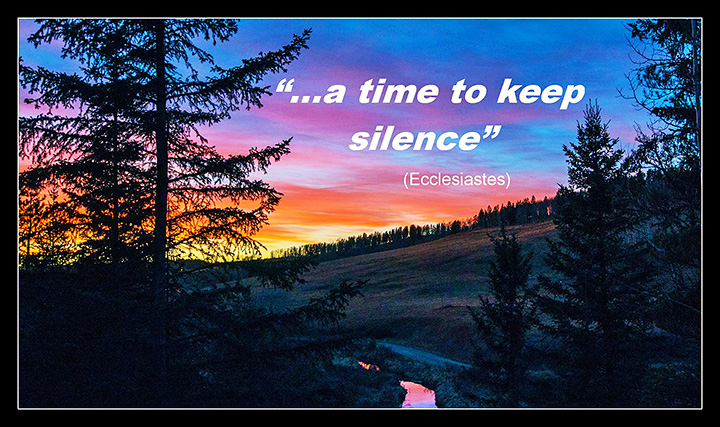
Silence, Lent and Stoney wayCOFFEE WITH WARREN, with Warren Harbeck |

|
Sunset from Robyn MacKay and Bruce Robert’s deck in the foothills northwest of Cochrane refreshes soul with silence. Photo by Warren Harbeck “For everything there is a season,” the oft-quoted wisdom declares; “a time to be born, and a time to die; … a time to keep silence, and a time to speak” (Ecclesiastes 3:1–7). “A time to keep silence”? These words are especially meaningful for me because of two important insights granted to me over the years. The first is from a recent Lenten meditation; the second, from over a half-century of learning at the feet of Stoney Nakoda Elders at Morley. Lent is the 40-weekday period of prayer and contemplation celebrated by many Christian traditions that begins on Ash Wednesday (March 6 this year) and ends at Easter. Embracing silence is an intimate part of the Lenten journey through the “desert.” Langley, BC, spirituality writer Naomi Toms – yes, my granddaughter! – reflected on silence in her online Lenten posting for March 10: “Silence and isolation … returned to our lives,” she writes. “The crowd of distractions, ever present in our contemporary everyday existence, has begun to melt away. This is our chance to embrace the silence. May we allow it to transform us … in that spiritual battle that has been there before us all along.” As they say, “silence is golden.” And in my life among the Stoney Nakoda community I have experienced that gold as a life-changing mirror reflecting some of the finest qualities in this respect-based culture. Silence in the Stoney way is all about the art of real listening – the art of being mindfully present to the moment and to those with whom we share the moment. It’s about discernment and patient waiting. It’s about not exploiting another’s intentional stillness to push our own agenda. Some folks tell me I’m not a bad conversationalist. If that’s true now, it certainly has not always been the case. I grew up in a social context where verbalizing ideas was a fast-and-furious sport. Even the slightest pause on the part of the person speaking to me was to be latched onto as an opening for me to bulldoze through with my own two cents’ worth. Fifty-four years with Stoney Nakoda First Nation Elders have dramatically changed all that for me. When I became associated with the Stoney community in 1965 as a linguist and Bible translation consultant, I naively assumed I had much to say. And weren’t my hosts fortunate to listen to me? Now in 2019, I know it’s really the other way around: Stoney Elders have long had much to say, and I’m the fortunate one if I indeed do the listening! Stoney Elders would sit down with me over tea and begin sharing their wisdom. But then they’d pause, and I would consistently misread their momentary silence as an invitation for me to cut in with my own inappropriate comments. They’d be incredibly indulgent of my ignorance, allowing me to ramble on and on. Then when I finally ran out of words, they’d pick up where they’d left off and continue what they were saying. In the Stoney way, silence is an important feature not only of conversation, but of life as a whole. I noticed this early on at wakes. You sit in the living room with 30 or 40 others, and never say more than a word or two the whole time. Your physical presence speaks more eloquently and comfortingly than all the fancy words in the world. Yes, “a time to keep silence.” Thank you, Naomi and my Stoney Nakoda Elders. Your wisdom refreshes my soul with silence like a beautiful sunset at the end of a noisy day. © 2019 Warren Harbeck |